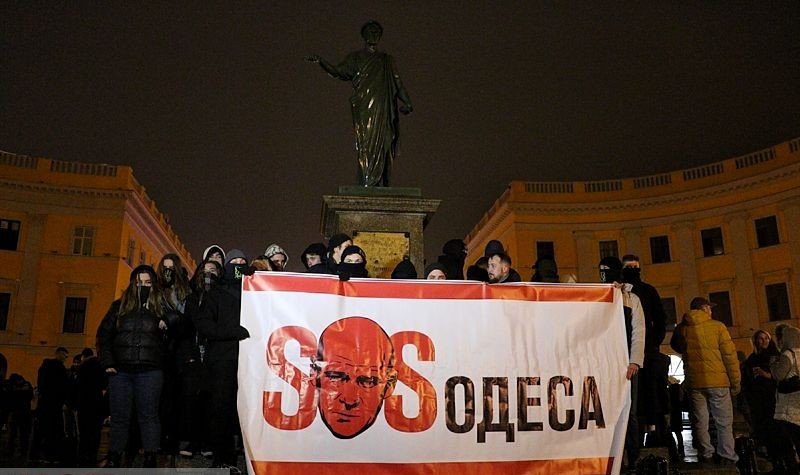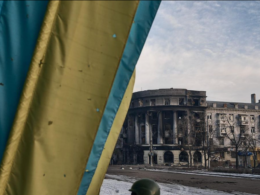Euromaidan Press talked to Odesa activist Vitaliy Ustymenko to ascertain how the situation in the city currently looks.

Ustymenko, head of Odesa Automaidan, an organization born during the Euromaidan Revolution which after it focused on the fight against corruption and law enforcement and judicial reforms, is as well familiar with the methods which local officials use to stop their opponents. He was attacked physically and had criminal proceedings against him on several occasions.
What is the conflict about
The majority of the city conflicts are taking place because of the seizure of public property by construction companies affiliated with the city mayor Hennadiy Trukhanov. Parks, sea coastal land, and areas of the city’s historic center are under threat of destruction. The conflict has also spread across the Odesa region.
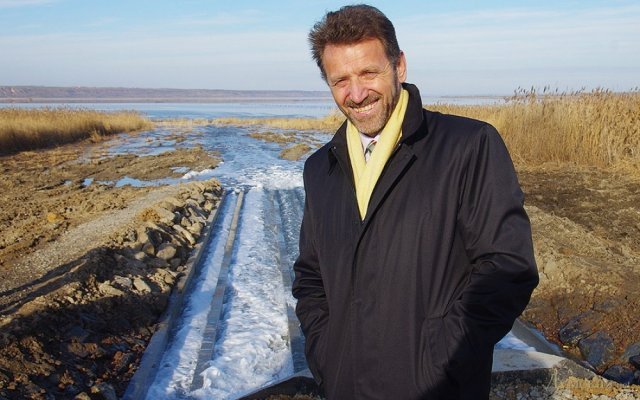
Ustymenko says that 2018 was particularly bad.
“Even the Prosecutor General said that the conflict in Odesa is related to seizure and development of public property. He ordered a stop to all illegal construction, but the very next day they went on and nobody could do anything about it.”
The case against Trukhanov
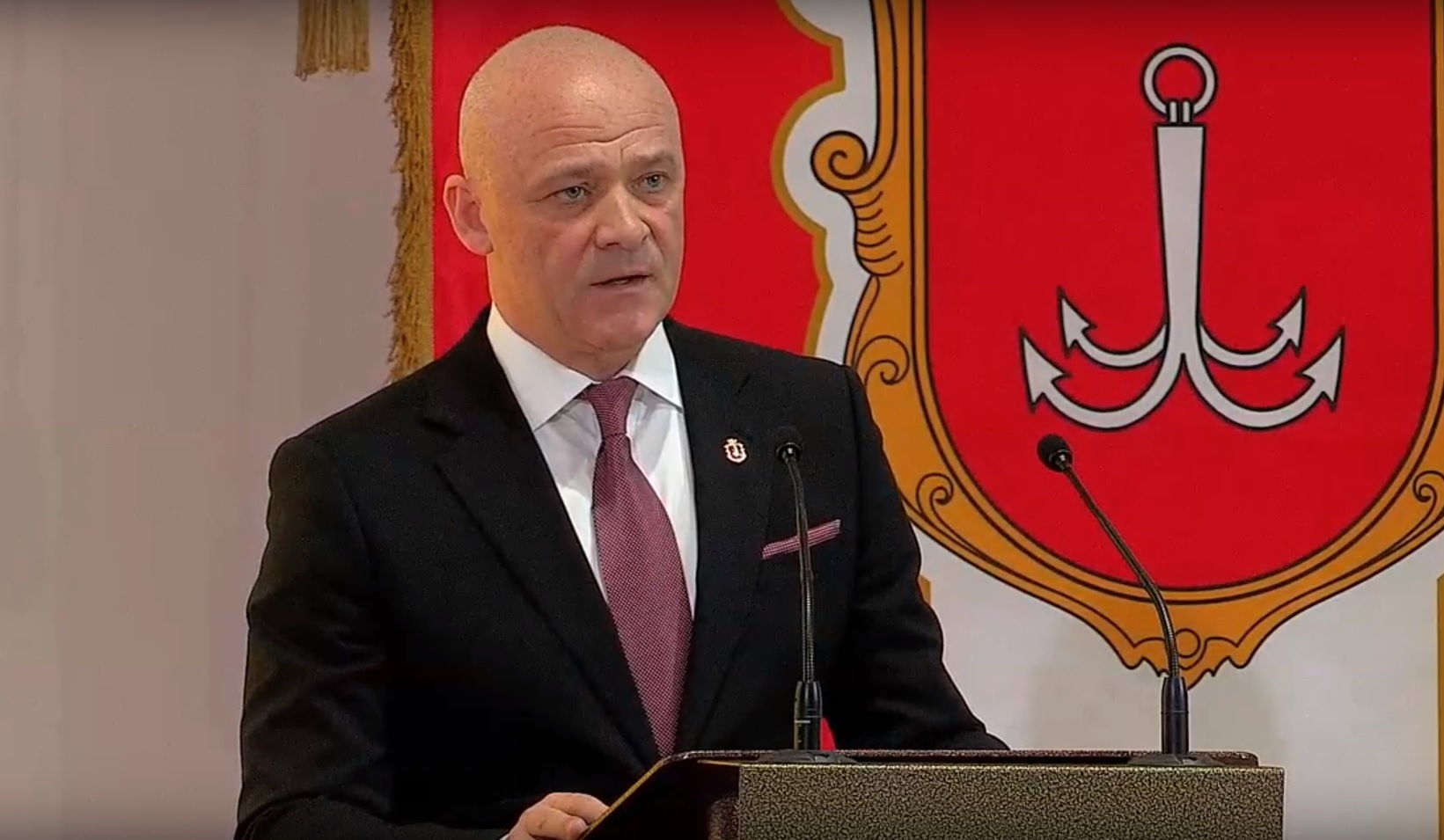
In February 2018, two new institutions, the National Anti-Corruption Bureau and the Specialized Anti-Corruption Prosecutor’s Office, initiated an investigation against Trukhanov. He and eight people from his inner circle are suspected of involvement in the embezzlement of UAH185mn (US$6.6mn) from the state budget. Usually, cases involving top-level corruption opened by the two bodies get bogged down in the courts. But not the Truhanov ones.
For example, on 14 January 2019 during just one court hearing against him, nine out of 67 case folders were considered and the next one was started, which equates to around 1,700 written pages. Experts in the Anti-Corruption Action Centre (AntAC) NGO suspect that the case is moving fast to save Trukhanov from the new High Anti-Corruption Court. Its creation is in full scale now. With the participation of international experts in the process, there are high expectations that the court will consider the top-corruption cases fairly. AntAC experts emphasize that the judges who are considering the case against Truhanov usually work at a much slower pace in other cases. For example, hearings on an armed robbery and premeditated murder have already been ongoing for five years, another involving a lombard scam for seven years.
The method of seizure
Ustymenko underlines that Trukhanov and associates are trying to gain maximum use of the time they have available.
“This is an unprecedented case of control over a situation by a certain financial group.”
Trukhanov’s inner circle is achieving this by changing the rules during City Council sessions. The activist provides an example of the plan to change the concept of the shore protection. According to this, the process of receiving permission for construction on the coast would be significantly simplified – only a signature of the head architect would be needed to build something on the beach. The activists with the help of media and MPs managed to prevent this question getting onto the agenda in the December 2018 session. However, this doesn’t mean that the local authorities abandoned the idea. Attempts to simplify the permission continued in January 2019.
Odesa authorities, the central government, and the “Odesa People’s Republic”
All of this is happening without the knowledge of the central law enforcement institutions and the central government. One of the most recent indications of their inaction was related to the situation regarding the treatment of the activist and regional political leader Oleh Mykhaiályk, well-known for resisting illegal construction at Odesa’s seaside. He was seriously wounded in a shotgun attack on 23 September 2018, and a bullet had to be removed from his lung. The medical operation to remove the bullet was performed in Germany back in January this year. The surgery could have taken place before the new year, however the activist was waiting for Ukraine’s National Police and the Public Prosecutor’s General Office. The law enforcement institutions should have provided documents on allocating international legal assistance to the German side.
“This system does not give me any other choice than going to the operating theatre knowing that the extracted bullet will lose its meaning as highly important physical evidence in the investigation and in the further court hearing on the case. It is the bullet which could have led not only to those who carried out the attempt on my life, but also to the intermediaries and those who ordered it,” Mykhaylyk wrote before the surgery.
In the end, the German side received documents which allowed German police to be present during surgery and keep the bullet.

Germany’s government was ready to allocate money for conducting expertise on the bullet. However, up to January 17 it had not received the documents from the Prosecutor General Office of Ukraine which would allow it to do so. Germany’s government also paid for the surgery and Mykhaylyk’s stay in the hospital. After the surgery the activist again expressed his mistrust towards Ukraine’s law enforcement authorities.
Ustymenko sums up that everything going on in Odesa indicates signs of the existence of the so-called “Odesa People’s Republic” (“ONR”), akin to Russia’s puppet Donetsk and Luhansk “People’s Republics” statelets in eastern Ukraine, which have since 2014 wrestled out of the control of the Ukrainian government.
“We talk about the ‘ONR’ because the central government institutions are not central to Odesa. The laws of Ukraine are not enforced in this particular area of Ukraine. There is no war and formally there are authorities and law enforcement institutions. However, they are absent in the cases where a certain financial group, which in fact controls the life of the city, has interests. Let’s talk about the territory which is not under control of Ukraine from the point of view of the law and the state, and which has its official and unofficial armies,” Ustymenko says.
The activist emphasizes that Ukrainian law enforcement bodies also ignore the evidence of Trukhanov having a Russian passport as well as his involvement in the international criminal group. Moreover, the activists point to the links between the City Council and groups which are in Russia.
The activist explains the ignorance of the central government by the agreements which exist between political elites.
“The elite which became central agreed with the elite which has an influence on the region. When we talk about law enforcement action and inaction at the central level, we talk about sabotage and backing.”
Ustymenko warns that if the balance and the agreement between the center and the regional Odesa group changes as a result of election or anything else, the separatism movements can be activated in the city again which might lead to the creation of an unrecognized republic. There were threats of its creation in 2014, just after the Euromaidan. Activists accused Trukhanov in covering the pro-Russian movements which opposed the Euromaidan Revolution and called for Russian intervention. He was also noticed at their meetings. The mayor himself denied the allegations in having pro-Russian stance. Back then, the separatist movements were defeated. Trukhanov was elected as the city’s mayor.
Trukhanov, Poroshenko, and elections
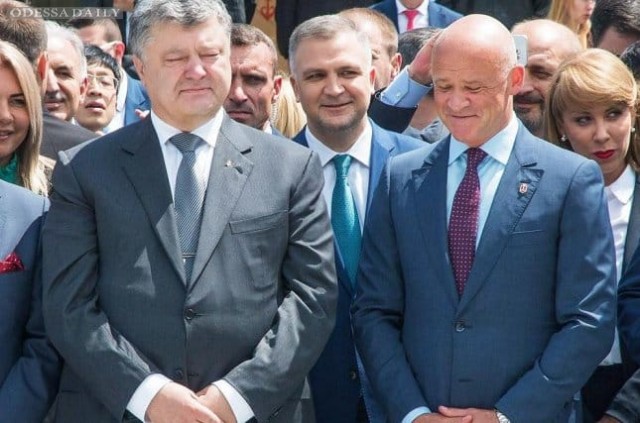
According to the activists, so far the unofficial agreement between President Petro Poroshenko and Trukhanov remains in force. The Odesa mayor helps Poroshenko get more views during the presidential election upcoming in March, while Poroshenko in his turn allows the regional elites to preserve their status. However, Ustymenko doubts that Trukhanov is able to provide votes for Poroshenko in any way other than by physical attacks.
“You can’t discretely falsify more than 5% of the votes, and this would still be obvious. Plus, Trukhanov supporters are pro-Russian, so they would hardly be persuaded to vote for Poroshenko. I think that there will be attempts to physically intervene in the process in Odesa. As there is no independent law enforcement in the oblast, this would be easy to do. However, of course we [the activists] will not be passive observers.”
To illustrate how serious the situation is, Ustymenko notes that the most discussed question among activists now is how to reduce their losses in the period before election.
“Our chances to influence the situation are so low, despite the public sector of Odesa being very strong.”
The activist can hardly imagine how to loosen the grip of Trukhanov’s group over the city.
“Once, Poroshenko placed his bets on these groups – not on civil society and not on state bodies. In my opinion, this is the strongest financial group in Ukraine. I cannot be sure that any other person or team would be able to use state mechanisms to remove the Odesa group from their position of power. For this, there should be a real anti-terrorist operation.”
Nevertheless, Ustymenko does not give up on civil society in Odesa.
Odesa civil society and Trukhanov’s front groups

Some time ago Trukhanov managed to create the illusion of having support with the city’s civil society. In 2015, there were around five civic organizations that served as his front groups, staging protests against Russian aggression, but keeping silence on Trukhanov’s lawlessness.
“They tried to show that they genuine activists by organizing some protests which were against some global things, but never against Trukhanov. You know, it doesn’t take much to say ‘Putin is evil’,” Ustymenko told.
But these fake organizations now are disassociated from the city’s real civil society, which has become stronger. The activist offers several reasons as an explanation:
- Those who participated in the Revolution of Dignity and the war have become more fearless.
- After 2014, civil society received many more formal instruments of control – open databases, asset declarations, opportunities to write petitions etc.
- Experts in different fields joined civil society to consult it on a variety of questions.
- Odesa residents have become more self-organized and have learned how to create coalitions.
Ustymenko says that the activists hope that an effective law enforcement system will be created. Despite all the troubles, he remains optimistic and believes that there will be a day when he himself will be able to benefit from the changes he and other local activists are fighting for. He also assumes that in the future, history books will describe this period as a dark chapter in Odesa’s history.




